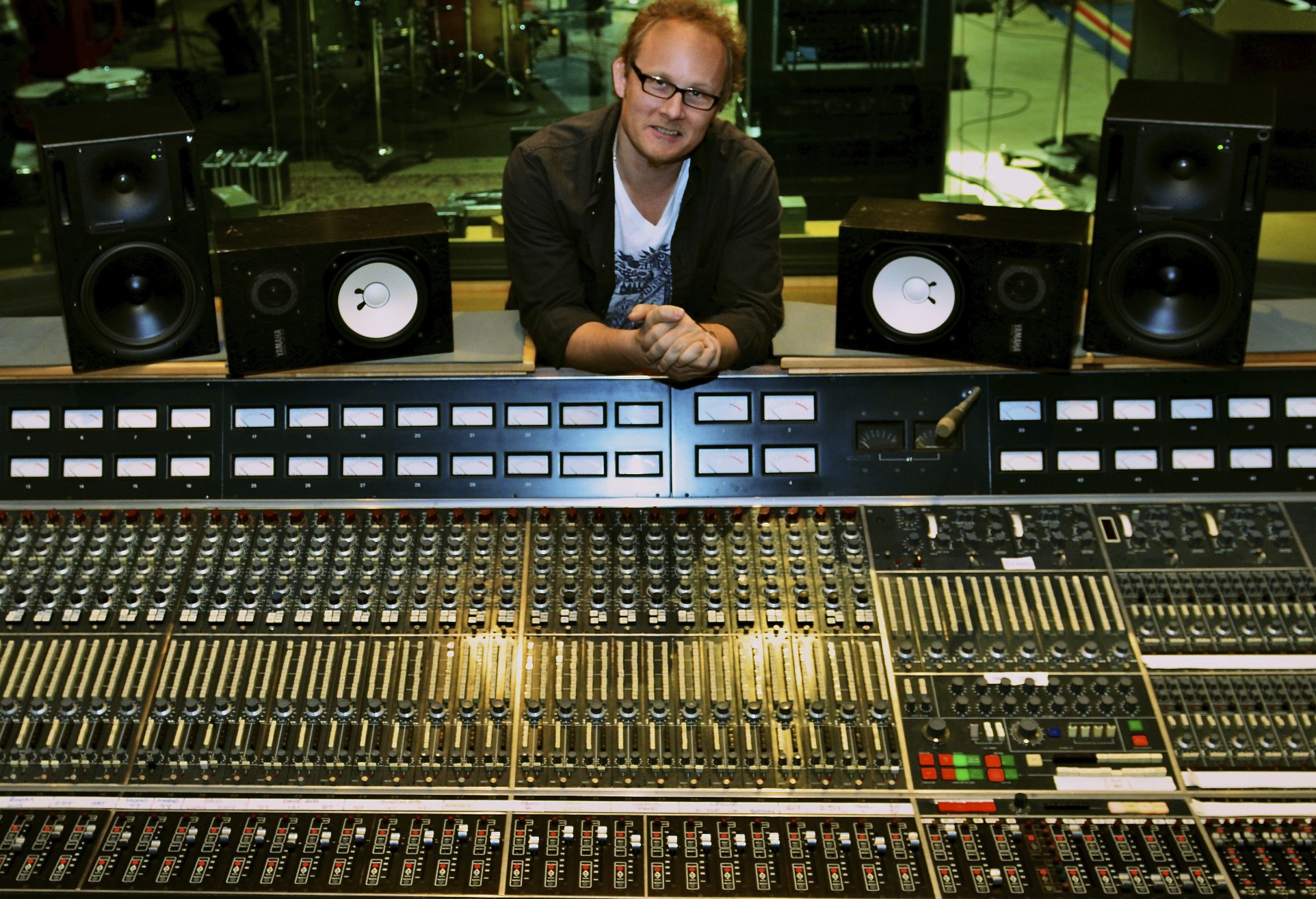Interview: Producer/Mixer/Musician Bill Appleberry Discusses Manning the Musical Helm for NBC's 'The Voice'

Three seasons ago, NBC launched its music competition program, The Voice.
At the helm each week to produce and mix every song that is sold on iTunes is Bill Appleberry, whose studio credentials include triple-platinum R&B group Shai, Stone Temple Pilots, Puddle of Mudd and rock band Adema, whom he also discovered and developed. Appleberry also is a highly respected keyboardist, engineer and arranger.
Born and raised in Chicago, he began with drum lessons as a child and naturally progressed to keyboards. He played in jazz bands during high school, and then enlisted in the Marines, where he furthered his music skills in the Drum and Bugle Corps. He attended the School of Music in Norfolk, Virginia, and was stationed in Washington, D.C., as a member of the Commandant’s Own.
Post-service, Appleberry began working in a Virginia recording studio, Cue Recording, where he learned to produce, mix and engineer. In 1992, he engineered and programmed the album Super Natural, by the band Everything, featuring the hit single “Hooch.” The album was mixed in Los Angeles, and in 1998, admittedly bitten by the West Coast bug, Appleberry relocated.
Through an unusual twist of fate, an engineer friend introduced him to the A&M (now Henson) staff, and he was hired within 24 hours. Through diligence, military work ethic, talent and a lot of late nights in the studio, Appleberry’s name now appears on albums, remixes, soundtracks, television series and, of course, The Voice.
In this interview, he discusses how he applies his skills sets to different projects and how all of those skills come into play when working with contestants on The Voice.
GUITAR WORLD: Producer, mixer and engineer — define those roles as they apply to your skill sets.
Get The Pick Newsletter
All the latest guitar news, interviews, lessons, reviews, deals and more, direct to your inbox!
I wouldn’t consider myself the textbook engineer. I approach the engineering side of things from a creative perspective, getting a cool sound. My production kind of starts with mixing in mind. I think of the end result from the top, and how I lay a track out and everything’s place in the spectrum, so it’s all like one big package to me. It took a long time to get there.
It was repetition. As with anything, the more you do it, the better you get — and trial and error. I’m 45, and I started when I was a teenager, so it’s interesting to look back. You try things, they don’t work out the way you wanted, you try differently the next time, and after enough next times, you learn.
When you’re hired for one skill, how do you keep the other hats on the shelf?
That’s another thing I’ve learned, and maybe it’s the military. The way you keep it on the shelf is you put your ego on the shelf too. Where I am in my career, I try to keep the ego outside the front door. As a producer, there are things you are responsible for, so if there’s something you feel passionately about, you have to fight for those things, but for the most part there’s probably more than one path you can take to get to the right outcome.
I try to create a very great team, an artist/producer relationship in the studio, because that’s important. You want to bring out everyone’s creativity. I lean more toward producing and mixing; however, I do engineer for other producers on a select basis. I like it, but it is harder for me to sit down in the engineering chair without taking on some kind of “let’s try this or that” kind of role. When I first got hired at A&M, because they hire from within, a lot of the runners who are trying to work their way up the ladder were a little upset, hoping they’d be the next one.
There was a guy, Tim Harkins, who didn’t like it very much. He’s now one of my best friends, and he’s my chief engineer on this Voice project and the manager of my crew, so we laugh about that. Funny how that works.
How long has it been since you toured? Your bio says you’re still open to it.
I started as a player and I will always love it. I toured in August of 2011 on a fusion tour in Australia for two weeks and that was a great time. If it’s the right thing for me and I can fit it into in my schedule, I will definitely go. When making the Stone Temple Pilots record, which took a year to make, the guys took two months off in the summer because they had to tour. Jakob Dylan called me and asked if I wanted to do a summer tour with the Wallflowers. The timing was perfect, and a week later I was on the road with them. I’m open to those calls. If it’s something I can do and I’m excited about it, I will.
Universal hired you in 2011. Did you have to think about it — going from independent to a staff job?
It’s not a staff job. I am still an independent producer. Tom MacKay at Universal Republic hired me to produce and mix all of the music on The Voice for them to release on iTunes. I have a lot of respect for Tom; he’s an amazing guy and great at what he does. I’ve learned a lot about the inner workings of record companies by working with him, and how to deal with multiple tasks at hand.
With The Voice, the interesting thing is obviously it’s television, and the workload is a tremendous challenge — I think I’ve done over 250 songs for them in the last year. I think Tom wanted to pick a guy that wasn’t emotionally going to have a meltdown, because it’s super-intense. I interviewed for the gig like I would any other record, and I am grateful for the opportunity. The timing was right and everything just kind of aligned.
I love the gig in so many different ways. I get to work with multiple people, which is very exciting. We approach everything like a record, so I keep all my skills intact and it’s great. It’s helped my career in a lot of ways because it forces me to make quick decisions with my records and I think that’s a healthy thing.
“As Universal Republic’s go-to guy on The Voice,” quoting your bio, you work “across the genres.” How is it different producing, let’s say, a balladeer, versus an artist who is all about beats and effects, versus a rock band?
In this business — at least it used to be, although I think it’s starting to loosen up a bit — you get a little pigeonholed from your last record. I had a hit with Adema when nu metal started to hit, so I became the nu metal guy and that’s the calls that come in. A lot of producers are super-musical and can do multiple types of music, but you get calls for the kind of work that you’ve just done and that’s kind of the way it is. With ballads versus doing rock songs, you have a lot more space and things are a little more organic and focused.
Hip-hop is beat-based; it’s groove and rhythmic phrasing. R&B is stacked vocal productions, which you might not necessarily have on a hard rock track, although with STP we did a lot of work with vocals and background vocals. Being a keyboard player and programmer is why I could cross over into the hip-hop world, but having played in rock bands I understand heavy guitar as well.
How do you work around the lack of experience with The Voice? What if it’s just not happening after a certain number of tracks? They can’t book another session.
You’re right, and part of that, I think, was how I actually landed this gig. Early on in the discussion about how to pull this off, I said, “We need to have a schedule: This person is in from 12 to 12:50 and a ten-minute break.” Out of the gate, we give these kids 45 minutes each, but it turns into an hour because I had to give myself some sort of time buffer, a couple of minutes just in case, to keep things on clockwork. Dealing with television, they go from recording studio to wardrobe to stage rehearsal and rehearsal with the band. Logistically, it’s crazy how things come together. Given an hour with a person who’s never been in a recording studio, if they’re having a hard time, I can navigate through that by coaching. I get as much as I can get.
You just have to know what you have and what you need to focus on. Certain people come through with one or two passes. You know you’ve got it and you could have gotten it in the first ten minutes, but you let them have the whole 50 minutes to have the experience and you walk out with eight stellar tracks. After a pass or two, it’s all fun and no pressure. The one thing I will say that’s a beautiful thing about this show is that as a producer working with 48 kids, I get emotionally attached to everyone. We get to know each other and we develop a stride.
These kids love to sing. They come in and sing this thing from top to bottom with no backlash at all. I’ve made records where you spend all day trying to get a verse, so it’s a pleasure to hear these kids and work with them.
Read more of Bill Appleberry’s interview right here.
— Alison RichterAlison Richter interviews artists, producers, engineers and other music industry professionals for print and online publications. Read more of her interviews right here.
Alison Richter is a seasoned journalist who interviews musicians, producers, engineers, and other industry professionals, and covers mental health issues for GuitarWorld.com. Writing credits include a wide range of publications, including GuitarWorld.com, MusicRadar.com, Bass Player, TNAG Connoisseur, Reverb, Music Industry News, Acoustic, Drummer, Guitar.com, Gearphoria, She Shreds, Guitar Girl, and Collectible Guitar.
“Around Vulgar, he would get frustrated with me because I couldn’t keep up with what he was doing, guitar-wise – Dime was so far beyond me musically”: Pantera producer Terry Date on how he captured Dimebag Darrell’s lightning in a bottle in the studio
“He ran home and came back with a grocery sack full of old, rusty pedals he had lying around his mom’s house”: Terry Date recalls Dimebag Darrell’s unconventional approach to tone in the studio










